#jujutsu kaisen ch 208
Explore tagged Tumblr posts
Text
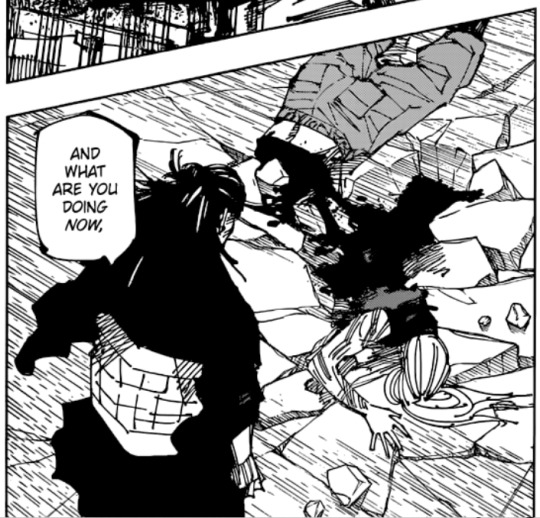
this is my 13th reason 😐
#gege's never beating the misogynist allegation#LIKE teasing us with yuki since the goodwill arc and the star plasma vessel arc ONLY FOR HER TO END UP LIKE THIS???????#also like the way when other characters died they were given a flashback or like a monologue or smth and she. has none 😐#gege did her so dirty#jujutsu kaisen#jjk#jujutsu kaisen ch 208#jjk ch 208#yuki tsukumo#jujutsu kaisen manga
31 notes
·
View notes
Text

OH MY GAWDD JUST KILL HIM
11 notes
·
View notes
Text
I’m not sure this will happen, but if Gege messes with “time” I will forever stan him.

I get the sense that gravity, mass and time can be considered a metaphor for “mind = body = soul”... like one is a microcosm for the other.
#jjk ch 208#god I love jujutsu kaisen#like for real#what kinds of crazy shenanigans does the cat have in store for us?#is he going to get all Evangelion on us?#is he going to take us behind the veil?!#is he going to show us Megumi's abs again?!!!!!!!!!!#so many questions#no answers
8 notes
·
View notes
Text
I just had a chance to read JJK chapter 208 and like… lmao I’m so confused. Every time I think I understand JJK’s magic system, Gege writes something new that leaves me going 🫠🫠
#JJK#jujutsu kaisen#jjk ch 208#JJK manga spoilers#yuki tsukumo#i AM CONFUSED#Choso#kenjaku is a bitch#someone get my boy out of the fucking box already
4 notes
·
View notes
Text
I have a lot of feelings about jjk ch 208 and I need to get them out. But no one I know irl is caught up so I am trapped.
1 note
·
View note
Text
there’s been so much released this week. Heads up for anyone who may have missed anything!
tues
- chainsaw man ch 116 (shonen jump)
- csm eng dub s1 ep 10
wed
- bungo stray dogs ch 105
- bungo stray dogs S4 ep 1
fri
- jujutsu kaisen ch 208 (shonen jump)
- my hero academia ch 377 (shonen jump)
- buddy daddies s1 ep 1 (new series premiere!)
sat
- my hero academia s6 ep 13
- blue lock s1 ep 13
- tokyo revengers s2 ep 1
#csm#bsd#bnha#jjk#buddy daddies#jujutsu kaisen#chainsaw man#my hero academia#bungou stray dogs#bungo stray dogs
10 notes
·
View notes
Text
Updated Manga: December 2022
Owari no Seraph: Ch. 121 added December 2nd
19 Days: Ch. 410, 411 & 412 added since December 3rd
Destruction Flag Otome: Ch. 52 & 53 added since December 4th
Jujutsu Kaisen: Ch. 206, 207 & 208 added since December 4th
Mahou Tsukai no Yome: Ch. 92 added December 6th

Akatsuki no Yona: Ch. 235 added December 8th
Boku no Hero Academia: Ch. 375 & 376 added since December 11th
Jibaku Shounen Hanako-kun: Ch. 97 added December 15th
Gekkan Shoujo Nozaki-kun: Ch. 138 added December 24th
#19 days#manhua#manga#manhwa#webtoons#boku no hero academia#gekkan shoujo nozaki kun#owari no seraph#akatsuki no yona#mahou tsukai no yome#destruction flag otome#jibaku shounen hanako kun#Jujutsu Kaisen
19 notes
·
View notes
Text

:((
8 notes
·
View notes
Text

sick beautiful bastard
7 notes
·
View notes
Text

the biggest L in the culling games so far & it was the most important one 🥲🥲🥲🥲🥲🥲🥲🥲
5 notes
·
View notes
Text

#her
#that’s muva#jjk#jujutsu kaisen#jujutsu kaisen manga#jjk manga#jjk ch. 208#she was a bad bitch to the end!
6 notes
·
View notes
Text

🫶🏾🫶🏾
6 notes
·
View notes
Text

Akutami really said “merry christmas! 🥰”
3 notes
·
View notes
Text
Tsukumo Yuki—Supernova, Twin Star and Jocasta
I am not sure how this turned into a chosoyuki meta but... let’s talk about chapter 208.

First: What the hell happened?
Second: What the hell happened?!!!!!!
Third: How does this moment land flat when it was most likely meant to hit hard? Gege is, after all, a genius at executing poetic justice.
But Yuki’s “death” was just... blah AND annoying.
So I decided to do mental gymnastics to try to understand the whole backstory that Gege only showed us briefly and that is written between the lines.
That said, this post is heavy headcanon influenced by canon and uses symbol analysis to fill in the blanks.
TLDR; I’m not entirely sure how this became a chosoyuki meta.
Depth Psychology 101: What is an Archetype?
Before we get started I thought it would be smart to define the word “Archetype”.
In extremely simplified simple words, an Archetype is a pattern of thought or behavior that is repeated across people and cultures throughout the world. The Archetypes are all “found” in what Swiss Psychiatrist Carl Jung called “The Collective Unconscious”--basically a massive pool of unconscious psychic material that all of humanity shares.
Just as a brief side note, the space between dreaming and waking that Kenny walks into in chapter 160, and Megumi’s shadow (at least from the Jungian perspective) both have “access” to this Collective Unconscious.
An example of an Archetype is “Jesus Christ”, an Archetype that is also seen in the Egyptian God Osiris. If you aren’t aware of their similarities, I recommend you go read about the topic.
Another example is the Sun. Since the Sun was a common experience to peoples of different cultures across the world, as an Archetype, it becomes a symbol that can have many different interpretations--one of the most common interpretations is that the Sun illuminates and gives life both psychologically as a concept, and physically as a literal object in our 3D reality.
This idea that the Sun can have a psychological influence on our minds as a concept is very important because Archetypes influence our minds through symbol AND operate underneath your conscious awareness. In other words, most of the time, you don’t even realize when you are being psychically and physically influenced by an Archetype.

Like Urie here getting eaten by a literal “devouring mother”.
Ok, that was extremely simplified but... moving on.
Yuki as Sun
Aside from the obvious interpretation that Yuki is, literally, a “star plasma vessel”, not to mention that the chapter titles in this recent arc all refer to “stars and oil”, there is other symbolism that Gege uses that ties Yuki to the concept of a “Star as a celestial body”.

The clue relies on surface understanding of Garuda’s symbolism, Yuki’s Shikigami.
Originally, Garuda is a mythological figure from Hindu and Buddhist lore that is renowned throughout Asia. In Hindu mythology more specifically, Garuda is known as a destroyer of sin and as the God Vishnu’s vehicle.
Since JJK’s Garuda is Yuki’s “tool” in much the same way the mythological creature is a tool for a God, I am going to associate Yuki’s power to be meant to be comparable to Vishnu’s in the JJK-scheme-of-things.
Now, amongst many other associations, the God Vishnu is known as “the preserver” because he maintains the order of the universe. But more importantly, he is also known as a solar deity.
So think of how all of the planets in our solar system are held at just the right distance from the Sun due to its gravitational force, and now consider how Yuki has been shown to use her Cursed Technique combining the concepts of mass and gravitational force.

She’s so fucking badass why did she have to die why god why?!
Now, let’s add a new layer beyond the obvious association to a Sun: Yuki as a dying Sun.
Yuki as Supernova
A black hole is basically formed when “[a star/sun] becomes unable to withstand the compressing force of its own gravity...”

“Stellar-mass black holes are born with a bang...”

“...They form when a very massive star (at least 25 times heavier than our Sun) runs out of nuclear fuel. The star then explodes as a supernova. What remains is a black hole” (source).
So what we have is Yuki sacrificing herself by ending her own lifespan as a Sun to create a black hole.
And this is where it gets really interesting to me because, as the mental gymnastics anime girl, psychological symbol analysis is my jam. What I’m interested in here is in learning what psychic process the symbol in question represents in the characters.
Huh?
Supernova as a metaphor for the sense of self
JJK can be very spiritual.
Not only does it present symbolism from many different religions, thus demonstrating an awareness of the vast diversity of ways that the human desire for transcendence of the material world can be expressed.
But Gege’s use of cursed energy, introduction of curses as sentient beings, how the characters navigate their ego, and the esoteric themes in JJK are all transcendental in and of themselves.
So when I say JJK is Jungian af, I don’t say that lightly.
All that to say is that, to understand Yuki on a deeper level, we need to look at the Supernova not just as a strictly physical phenomenon, but as a symbol for reaching the pinnacle of one’s existence and sense of self.
After all, in a story like JJK where the strongest sorcerers have the strongest sense of self, Yuki’s sense of self basically burned so brightly that it consumed her--and I think there’s something very poetic about that.

I also personally loved learning that her will suppressed the intensity of the explosion. It’s almost like she was looking out for others up to her last moment as a conscious entity in this realm of existence.
And if you find yourself thinking: “wait, did he really just kill her?!”
Well, this is when things get a little... ok, yes, a lot disappointing.
“Because... what about her motivation as a character?!”

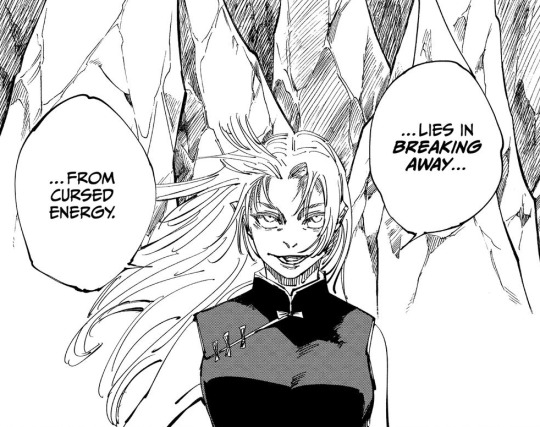
“Are you fudging kidding me?! What do you mean Gege just killed her off?!
What’s going to happen to her motivation? He can’t just make that storyline go *poof* and make it disappear!”
Ok, first of all Karen, yes he can, he’s the mangaka.
I’m Karen, I’m talking to myself here.
Second, because of her exalted role in the plot, and probably also very likely because she literally represents a Solar Archetype to which we all felt naturally drawn to (because that’s what archetypes do when in an unconscious state), we all took the bait and thought she was going to stick around for much longer than she did.
High expectations make for disappointment when not managed correctly.
So I’m not sure if this was master manipulation on Gege’s behalf or a happy accident. Basically after writing this meta, I like to think of Yuki as a masterclass on how to use an Archetype to define how an audience perceives a character.
But to address the Pink Elephant in the room, I can’t deny that in killing Yuki, Gege did indeed show us the deeply rooted unconscious expression of how Japanese society might view women as expendable creatures whose purpose is to become a sacrifice to support their male counterparts.
In my opinion, if this is the case, he probably didn’t even notice he was doing it.
The question is, if Yuki was a male character and Gege did kill this male character like he did with Yuki, would the story loose its meaning?
But back to JJK... because of the symbolism, I really do think Yuki was meant to be a character who Gege planned to kill from the beginning. Most especially because of two more Archetypes that could be at play here, which I will mention as the ramble progresses.
To wrap things up with Yuki...
The thing with Yuki as a Supernova that has metaphorically reached the pinnacle of it’s existence as a Solar entity, is that a Supernova is a transformational symbol that ushers one state of being into a new way of existence in a violent manner--its basically alchemy. So Yuki surviving this explosion is a matter of who and what she becomes next.
Is she perhaps still alive somehow and has she been changed as a result of such a massive and powerful explosion?
Will she become a ghost/curse that haunts Choso for the rest of his life?
Or will her legacy (motivation) live on through others?
And since JJK has been underscoring the importance of the “sense of self” ever since it’s humble beginnings, I can’t help but associate the Supernova with Yuki’s sense of self achieving some sort of pinnacle of existence.
“I long to feel my heart burned open wide til nothing else remains, except the fires from which I came”
- Nova, VNV Nation
I like to think of Yuki as someone who found deep peace within herself to where she could basically commit suicide because it was the right thing to do in that moment.
I also reckon Yuki had been searching for “something” that she was finally able to find in the moments before her death.
And if that isn’t poetic justice, then I don’t know what is.
The Twin Star archetype
This is a deep rabbit hole y’all. Mental gymnastics aren't even enough to begin to unravel the depth of the Twin Star archetype as it is used with chosoyuki because “incest” as an archetype is also at play with them.
In fact, here’s your official warning...

Things are about to get weird y’all, so keep an open mind or stop reading.
As a result, this headcanon gets even more headcanon because my personal interpretation of the supernova symbol also takes into consideration another major interpretation of “star” as symbol--that is the idea of a Twin Star or a lover’s fated encounter with their “match”--the beloved.
So if you’re following me down this rabbit hole... I welcome you into the realm of romantic soulmate bonds. This is where this whole ramble inadvertently and rather surprisingly turns into a chosoyuki ramble--not necessarily because I ship them, but because I would have liked to see more of this dynamic that was hinted at.
In the end, I think one of the main reasons the arc fell flat is because we didn’t get to see this dynamic fleshed out. The symbols are all there, but the execution ultimately fell short.
Moving forward, the thing to keep in mind is that Yuki isn’t the only one with Dying Star symbolism.
No, she has a Twin Star...
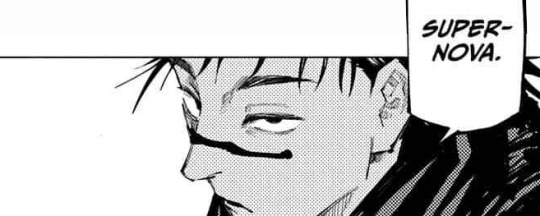
First, I cannot underscore how important it is to consider the circumstances in which these two Twin Stars came together. They’re Twin Stars after all, right?
They are a doomed OTP.
They can’t be together.
Which means one of them must die, better yet if it is in a double lover’s suicide attempt. And at this point in JJK, aside from Sukuna, is there anything more dangerous and suicidal than taking Kenny on?
Second, if you want to go even deeper into this crazy Twin Star symbolism rabbit hole, the sibling incest trope that Gege uses throughout JJK is, at an Archetypal level, a representation of the Hieros Gamos--the divine wedding which is sometimes represented by twins (or metaphorical twin stars in this case) and/or siblings.
**Please, I implore of anyone thinking that this means incest irl should be supported not to take the symbols literally. These symbols live beyond conscious awareness and are not to be taken literally but rather metaphorically.**
What JJK does is that it takes the symbol of the Twin Stars and the Alchemical Wedding of the siblings, and uses Yuki and Choso as literary carriers of the symbols.
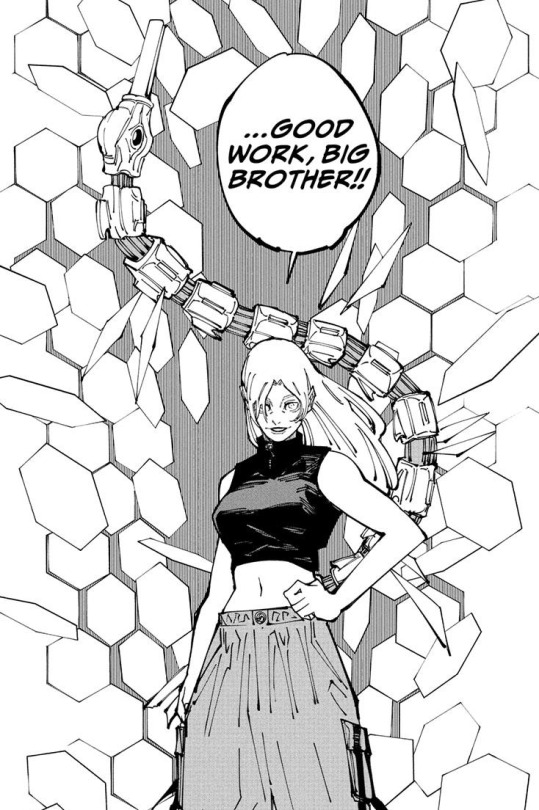
In that sense, Yuki playing the imoto role is not just a kink or a trope, but a representation of an archetype--she’s one in a pair of Twin Stars.
The thing about the Twin Star pairing is that they are somewhat defined by the romantic longing for the other. The longing is so strong that it is even seen as a form of psychological “sickness”.
So I got to wondering if this is why Gege made the point of showing us a very peculiar trait about Yuki’s character... the fact that she would ask others about their type.
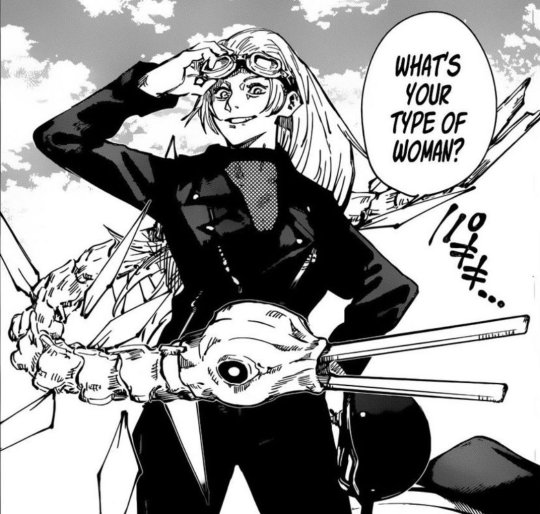
What’s your type (of woman)?
Sorry but...

When this man gets animated the internet is going to break...
But what does the question “what’s your type?” try to get at?
More importantly, what is the person answering that question trying to convey?

And like... if I’m honest, I LOVED Yuki verbalizing that her type is Choso. It’s a nice payoff to this question getting asked a bunch of times but never having a real concrete answer...
As for Yuki, the look on her face speaks a thousand words. I like to think that Yuki feels glad to have met Choso and has come into a sense of self in which she’s satisfied to have met her match as one of the many things that she sought to accomplish as part of her life journey.
That is not to say that Yuki was solely motivated by her romantic longing. Quite the opposite, if you look at the possible meaning of the kanji in her name, it speaks to a person who values and prioritizes her freedom as the basis for her sense of self (由 phonetically sounds like “yu” and is also used in the word “freedom” and 基 (ki) means “basis or foundation”).
I also love the way in which for every one of these panels of Yuki verbalizing what her type is, we get the corresponding picture of Choso embodying the qualities Yuki considers to be her type.

It’s kind of beautiful to watch this little sequence if I’m honest.
To add another fun layer to this, my favorite part about this whole thing is that we don’t get a soapy love declaration. Rather, even as she verbalizes who her type is, she’s completely and 300% unhinged during this whole battle sequence...

I think her capacity to let herself be consumed by her madness is one of my favorite things about Yuki because my favorite characters in JJK are always those that give themselves that range.
Shinjū--The Double Lover’s Suicide
But back to this idea that Choso and Yuki found each other under circumstances where one if not both of them could die...
“In Japanese theatre and literary tradition, double suicides are the simultaneous suicides of two lovers whose ninjo, (personal feelings) or love for one another are at odds with giri, social conventions or familial obligations” (wikipedia).
With chapter 208 we have a conversation about what it means to be and live as a human, and what it means to be and live as a curse. If you think about it, from this perspective alone, Choso and Yuki’s relationship is at odds with social conventions right from the start.

And when you see that whole setup they had going where it looked like they were just hanging around each other in the most ridiculous of setups... it’s hard not to think of this as michiyuki.
“The tragic denouement [of a double lover’s suicide story] is usually known to the audience and is preceded by a michiyuki, a small poetical journey, where lovers evoke the happier moments of their lives and their attempts at loving each other” (wikipedia).
I mean... Choso and Yuki were both literally going on little dates and wearing Black Tie while having casual and deeply intimate conversations about life while sipping on Dirty Martinis.
How much more michiyuki does it get than that?
To me, this is amazing writing, and one of the reasons I love JJK--the authorial intent behind the ridiculousness depicted always serves a purpose if you know where to look for clues.

Back to chosoyuki...
The thing to remember is that at the core of this interaction there is a sense of finality. I reckon Yuki was highly cognizant that if it came to it, she would have to do the whole “Supernova” thing and die in the process.
And to finally meet the person she had been longing for that she didn’t know she was longing for is what the Twin Star trope is all about.
In other words, Choso and Yuki found each other when the odds of living through a dangerous ordeal were at the lowest they could possibly be.
And if you think about this from the perspective of the “double lover’s suicide”, to take Kenny on is suicidal.
Ok but that’s not all there is to chosoyuki. The other Archetype defining their arc as individuals and as a pair is the Oedipus Rex myth.
And in true Oedipal fashion, Choso has to kill Kenny (his father) in order to be freed from his unconscious “incestuous” bond to his “sister” so that he could become human and enter into a human relational dynamic.
Yes... this rabbit hole just keeps going deeper...
Patricide and Choso’s Oedipal Complex
Regardless of how disappointing Yuki’s death was, the way Gege uses Archetypes/tropes in the narrative is nothing short of genius. In other words, the high level Archetypes he uses always influence and define a character arcs like I believe it happened with Yuki as Supernova and Twin Star.
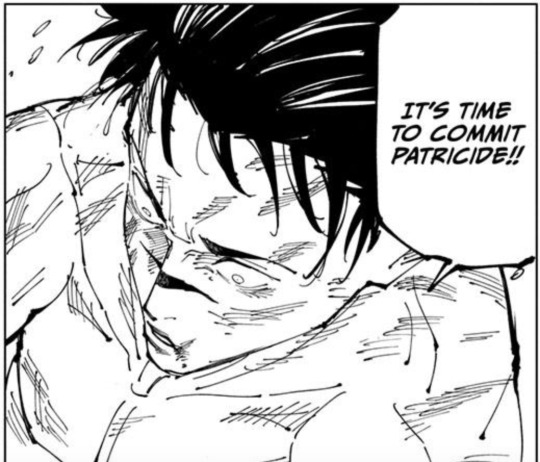
And now Gege gave us the above panel with Choso deciding to commit patricide as a clue to what Archetype might be ruling his character development.
Also this is about the point in my mental gymnastics that I start to feel like I sound like a crazy person.

But like hey. The symbolism is all there, so I’m going to keep over analyzing because that’s how I roll.
Now...
For context, we will want to think of Choso as Oedipus Rex, everybody’s favorite incestuous patricidal mother focker. Literally.
The main difference between Oedipus as a character and Choso as a character is that the metaphorical marriage that Choso enters into is between brother and sister pair (Hieros Gamos), and not son and mother--thus denoting a certain level of equality.
Quick detour here to give you a friendly reminder to not take the symbols literally. These are all metaphors for deeply engrained and largely unconscious psychic processes and I do apologize profusely for not being able to ground these terms into everyday life terminology. IT’s NOT EASY!
In fact, this is one of the reasons why Jung and Freud parted ways in their shared understanding of how the Collective Unconscious influenced the psychology of the “modern man”.
Freud would interpret Choso’s symbolism as his desire to commit literal incest and sleep with his mom. Jung, on the other hand, asked for the symbols not to be taken literally but rather to apply meta thinking to them so that they could be looked at metaphorically.
To quote Jungian Analyst Julian David:
“That psychic incest spills over into actual incest is beyond doubt. It happens when an individual cannot distinguish between the realms and falls victim, therefore, to the law which governs the relation between psyche and reality: that what is not dealt with psychically comes upon us, from outside, as fate.”
This ramble got really deep all of a sudden... it was just a chosoyuki rant.
Back to Choso as Oedipus...
In a nutshell, from a Jungian perspective, the Oedipus Rex myth is about the interplay between human nature when up against the inevitability of fate and destiny. In that sense, Oedipus too is a symbol of consciousness (here we have the Sun as archetype at play in Choso once again).
In the story, Oedipus is compelled by fate and his own nature to kill his father and marry his mother. This alone makes me wonder whether Choso will be the one who kills Kenny in the very end.
But I think the most relevant detail here is the idea behind Choso living on as human.
Now, there's a lot more to the Oedipus Rex story that I am not sure how or whether it will have a role to play in the JJK-scheme-of-things moving forward. But one thing is for sure--when Oedipus finds and proclaims his humanity, Jocasta, his mother/wife, commits suicide.
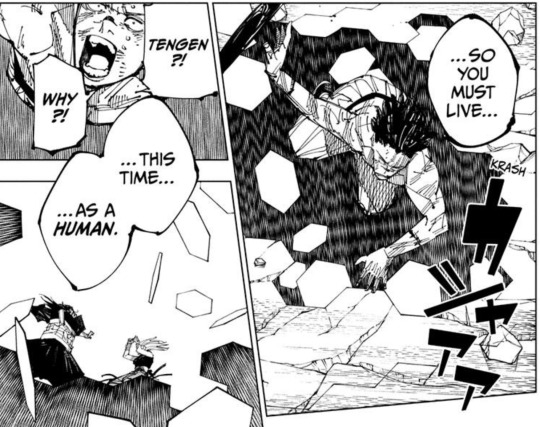
I am not sure whether this is all a happy accident or deliberate authorial intent. But if it is the latter (which I really hope it is), I think Gege is a fucking genius for hiding the Oedipus Rex myth as a metaphor for Choso’s character development and Yuki’s ultimate and predictable death.
Of course, again, this is all what I headcanon could be written between the lines and I am aware that I am taking canonical facts to validate my headcanon. It’s just that the symbols are all there telling a story on their own.
TLDR;
Does it still suck that Yuki died? Absolutely. She was an amazing character. I’m still in denial about her death if I’m honest.
Was the chosoyuki arc well executed? Eh. Not really. Honestly, I have to wonder what happened with this little side story. It felt so rushed and forced and like it came out of left field that I have to wonder why it made the cut into the chapter at all.
Again, Gege went to town with the symbolism so I think there was a story he wanted to tell in the dynamic that these two characters shared if only for a short moment.
The problem was that Gege relied on symbolism to tell the story and didn’t take the time to show his audience a deeper reason to care for chosoyuki. Instead we get a few panels of “what could have been”.
Don’t get me wrong, it’s not that I don’t think chosoyuki makes sense. Quite the opposite, I personally would have liked to see more chosoyuki and not have it crammed into a few panels towards the end of an arc.
Was Gege in a rush?
Did he not know how to execute because he truly does think he sucks at writing romance?
Was he told not to include this side story by his editors?
Or Is Yuki as a character simply a victim of a Japanese man’s unconscious bias about women?
Or maybe... just maybe, the above is true, AND it goes deeper than that.
Whatever you decide, as Oedipus, it is your responsibility as a conscious being to make a choice as a human and decide whether you will be bound by your fate.
Boom.
To anyone who reads this, I hope the mental gymnastics made ANY sense lol.
I think my thesis advisor would have given me a B+ for this meta and then would tell me I need to understand Oedipus Rex better.
#chosoyuki#choso#tsukumo yuki#jujutsu kaisen meta#jjk meta#jujutsu kaisen analysis#jjk analysis#jujutsu kaisen spoilers#jjk spoilers#jjk ch 208
314 notes
·
View notes
Text
LOL
hmmmm maybe Yuki x Choso will be a thing
5 notes
·
View notes
